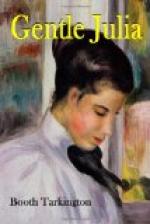“You ‘think someone told’ you!” Noble groaned. “Oh, Julia! And here it is, all down in black and white, in my pocket!”
“I haven’t the slightest idea what you’re talking about.” Julia’s tone was cold, and she drew herself up haughtily, though the gesture was ineffective in the darkness of that quivering interior. The quivering stopped just then, however, as the taxicab came to a rather abrupt halt before her house.
“Will you come in with me a moment, please?” Julia said as she got out. “There are some things I want to ask you—and I’m sure my father hasn’t come home from downtown yet. There’s no light in the front part of the house.”
CHAPTER TWENTY-TWO
There was no light in any other part of the house, they discovered, after abandoning the front door bell for an excursion to the rear. “That’s disheartening to a hungry person,” Julia remarked: and then remembered that she had a key to the front door in her purse. She opened the door, and lighted the hall chandelier while Noble brought in her bags from the steps where the taxicab driver had left them.
“There’s nobody home at all,” Julia said thoughtfully. “Not even Gamin.”
“No. Nobody,” her sad companion agreed, shaking his head. “Nobody at all, Julia. Nobody at all.” Rousing himself, he went back for the golf tools, and with a lingering gentleness set them in a corner. Then, dumbly, he turned to go.
“Wait, please,” said Julia. “I want to ask you a few things—especially about what you’ve got ‘all down in black and white’ in your pocket. Will you shut the front door, if you please, and go into the library and turn on the lights and wait there while I look over the house and see if I can find why it’s all closed up like this?”
Noble went into the library and found the control of the lights. She came hurrying in after him.
“It’s chilly. The furnace seems to be off,” she said. “I’ll——” But instead of declaring her intentions, she enacted them; taking a match from a little white porcelain trough on the mantelpiece and striking it on the heel of her glittering shoe. Then she knelt before the grate and set the flame to paper beneath the kindling-wood and coal. “You mustn’t freeze,” she said, with a thoughtful kindness that killed him; and as she went out of the room he died again;—for she looked back over her shoulder.
She had pushed up her veils and this was his first sight of that disastrous face in long empty weeks and weeks. Now he realized that all his aching reveries upon its contours had shown but pallid likenesses; for here was the worst thing about Julia’s looks;—even her most extravagant suitor, in absence, could not dream an image of her so charming as he found herself when he saw her again. Thus, seeing Julia again was always a discovery. And this glance over her shoulder as she left a room—not a honeyed glance but rather inscrutable, yet implying that she thought of the occupant, and might continue to think of him while gone from him—this was one of those ways of hers that experience could never drill out of her.




